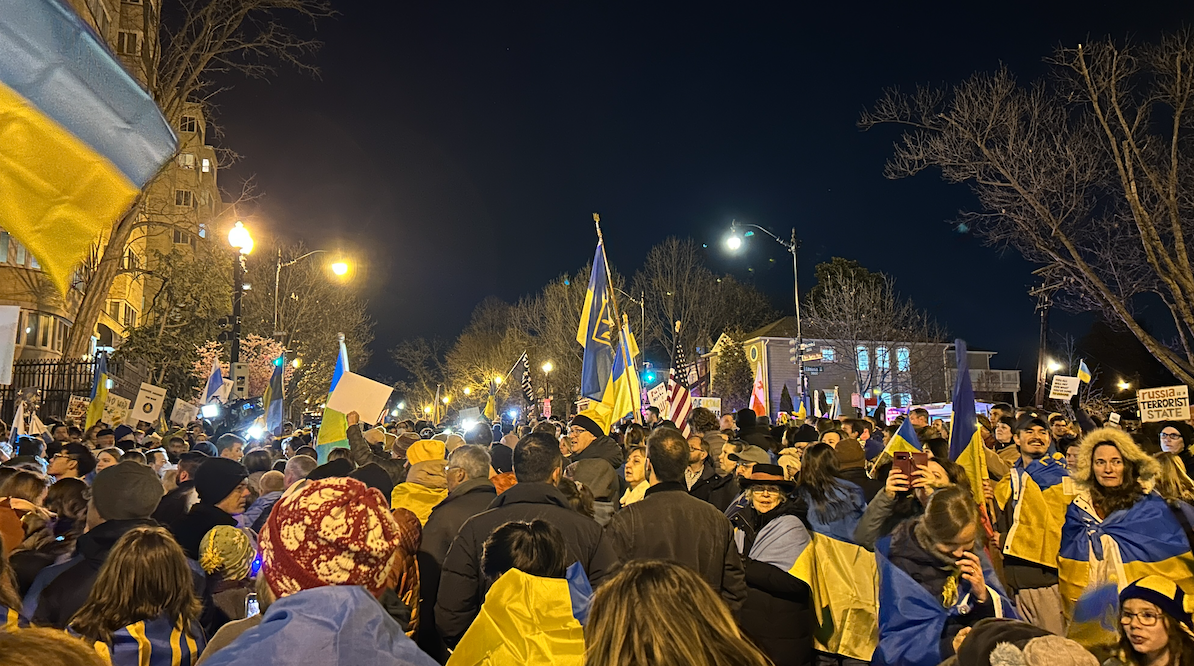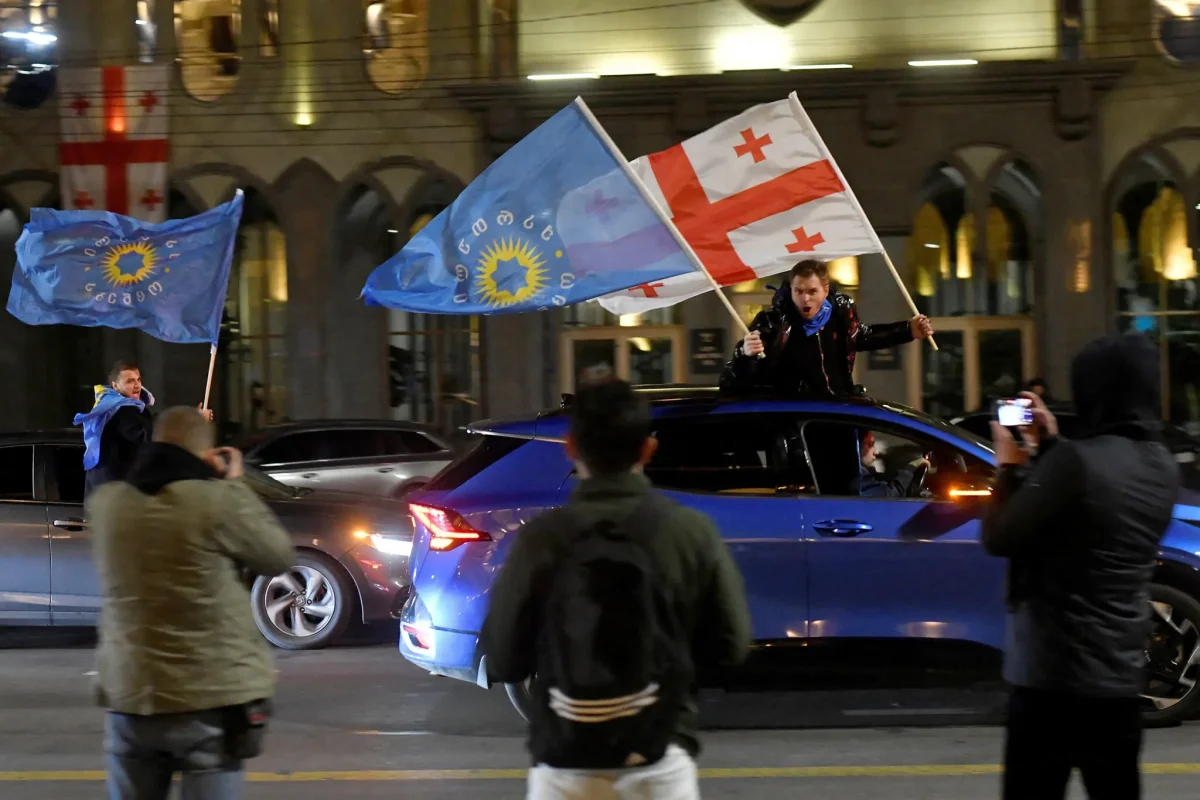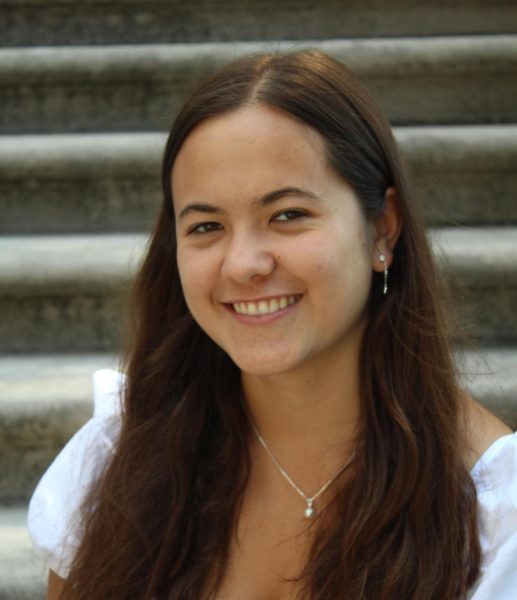The Russian invasion of Ukraine in February 2022 has left an impact on WIS students, whether it was in their personal lives or their extracurricular activities. Several students have gotten involved in protests against the war and organizations that support Ukrainians.
Junior Anton Usdin, who is Russian, is strongly against the war. He attended a protest organized by the Ukrainian Congress Committee of America on the one year anniversary of the war in front of the Russian embassy, where a Ukrainian flag was projected onto the outside walls of the embassy.
“It’s good to advocate for things that you’re passionate about, and I’m very passionate about expressing my feelings on the Russian-Ukrainian conflict and the war crimes being committed there,” Usdin said. “So I wanted to get involved and share my voice with the community.”
Usdin does not attend many protests, but he found the experience extremely moving, particularly when Ukrainian refugees discussed their personal experiences. Some had left before the war or had been born in Russia, but did not hesitate to shout vulgar insults about Russia. Others had left during the war and recounted leaving their belongings behind to flee to a brand-new country.
“It showed me how, even if you think what you’re doing is insignificant, it does still have power,” Usdin said. “There were TV crews there and everything. So it showed me that it is worth it to get involved [in] what you believe in.”
Another way in which Usdin is getting involved is by tutoring a middle-aged Ukrainian refugee living in Bethesda via Zoom. He converses with her in English, helps her practice her writing skills and assists her in applying for jobs so she can become more accustomed to living in the U.S. Though the process can be difficult, Usdin finds it rewarding to see her progress.
Junior Daniel Gurenko, who is Russian, is also tutoring students online through an organization called Ukraine House. He is teaching a nine-year-old student who lives in Ukraine in an effort to help make up for the decline in education in Ukraine since the outbreak of war.
“I really wanted to help Ukraine somehow,” Gurenko said. “I thought that this is the best way I can do it because I enjoy teaching other people; it’s something that I’m proficient at.”
He teaches English to the student, who is a complete beginner, and they communicate in Russian. Gurenko hopes that this will give the student more opportunities in the future, such as studying abroad.
The student lived in Kyiv but moved to Lviv due to the frequent bombings in the country’s capital. There are still bombings around his home, which can cause power outages or prompt him to relocate to a bomb shelter, preventing him from attending certain classes. On other occasions, the student is in different locations for the lessons. “It’s definitely really sad every time that happens,” Gurenko said.
Another way in which Gurenko has gotten involved is by taking part in a project that planted sunflowers, the national flower of Ukraine, in front of the Russian embassy as a form of protest against Russia. He found out about this opportunity by seeing flyers around the city. “I thought that was cool because it’s a statement of defiance against them,” he said.
Freshman Danylo Volynets is Ukrainian. He lived there until about two years ago and all of his family is from the country. Since the war broke out, there has been much more stress in Volynets’ life since most of his family is still in the country, especially when they experience power outages.
His mother works with the Ukrainian government in D.C., and he sees her less often since the war broke out. Every month or so, his father goes back to Ukraine to support their family. Since there are no direct flights from the U.S. to Ukraine, he has to fly to Poland and take a car to Ukraine.
Volynets is planning to travel to Ukraine this summer to spend time with his family for a few weeks. He has mixed feelings about going back. “[It’s] not scary, but stressful,” he said. “And [I’m] excited because I haven’t been to Ukraine in a year or more, and I will see my family in person again, so that’s good.”
A year after the start of the war, Volynets noticed that conversation about Ukraine has dwindled. Whenever Ukraine is brought up, though, it is in the context of the war.
“Most of the focus is there’s a war happening and there’s not much focus on [Ukraine] as a country itself, but I don’t think that’s avoidable,” he said.
Though his friends are aware of the situation in Ukraine, Volynets usually talks about other aspects of the country with his friends. “Mostly when I talk about Ukraine, I talk about cultural things before the war,” he said. “I tell them stories from my friends or different places I used to go to there.”
Though people can help Ukrainians through charities and food banks, Volynets believes that there is not much Americans can do on an individual level to help Ukraine. “Being aware about [the war] is enough for most people,” he said. “I don’t think anybody can change how it goes right now.”
He does, however, appreciate the Ukrainian flags hung up around the city in solidarity. “When you walk around and see something that you relate to, that’s just, personally for me, nice,” Volynets said.
On the other hand, Gurenko feels that, while the U.S. government is doing a lot, American individuals could be doing more to help Ukrainians. He encourages people who speak Russian or Ukrainian to join the Ukrainian House tutoring program.
“If everyone donated to drives or did some initiative like this, I think that will definitely help the war end faster,” he said.
Usdin also thinks that people at WIS could be doing more to support Ukraine. “Even something as simple as hanging up a Ukrainian flag outside your house shows your solidarity and support for them,” he said. “That’s definitely a gesture that doesn’t go unappreciated.”
By Naomi Breuer


































































